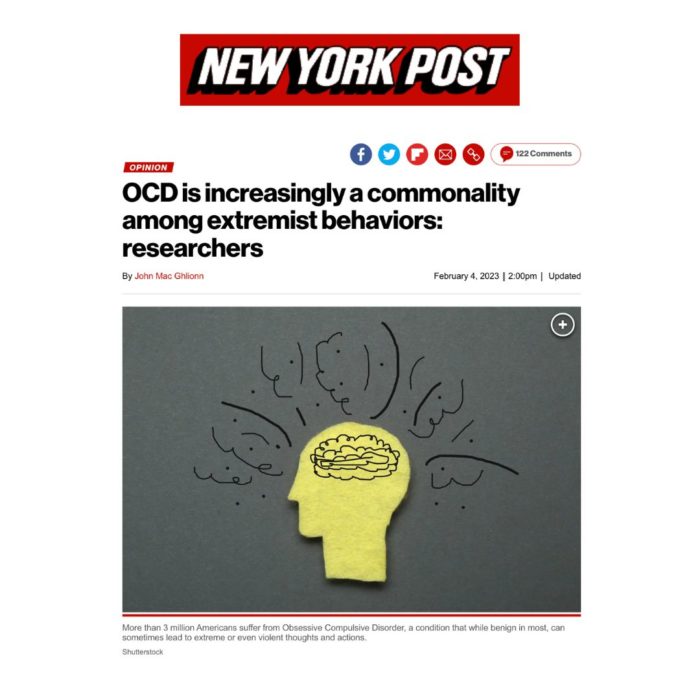“That’s Bananas” is a series in which Mental fact-checks misleading and inaccurate mental health coverage.
An article that recently appeared in the New York Post attempted to link OCD with violent political extremism, citing climate activist Greta Thunberg’s OCD as part reason for her activism.
“Thunberg would appear to have little in common with, say, Islamic fundamentalism or radical trans-activism. But Thunberg suffers from obsessive compulsive disorder (OCD), a condition that researchers increasingly say correlates with passionate and extremist behaviors—the types that fuel her aggressive commitment to eco-activism,” the author writes, next to a picture of Thunberg non-aggressively holding up a sign. Indeed, if Thunberg is extreme in anything, it’s in her extremely nonviolent manner of protest.
 The Post cites a theory—note: “theory,” not “clinical study”—from two psychologists who link “what they term ‘obsessive passion’ (a key predictor of radicalism) to a much larger body of behavioral research.” The author goes on to say that obsessive passion is “when a commitment to a goal turns pathological. One can become obsessed with just about anything: food, pornography, activism, another individual, or, in extreme cases, acts of violence. And OCD, it seems, is the spark that lights the radical fire.”
The Post cites a theory—note: “theory,” not “clinical study”—from two psychologists who link “what they term ‘obsessive passion’ (a key predictor of radicalism) to a much larger body of behavioral research.” The author goes on to say that obsessive passion is “when a commitment to a goal turns pathological. One can become obsessed with just about anything: food, pornography, activism, another individual, or, in extreme cases, acts of violence. And OCD, it seems, is the spark that lights the radical fire.”
For the record, obsessive passion has nothing to do with OCD. The Post seems to be using it to discredit causes they don’t agree with. Consider the nonsensical juxtaposition of these two things in the story:
- An image of two people at a trans-rights protest, one holding a sign that says “Stand by your trans!” while hugging another person who appears to be crying
- This caption: “The often rabid and even violent nature of extreme transgender activists suggests the tendency for obsessive beliefs has entered into the social justice arena.”
This ridiculousness would almost be funny if it weren’t so damaging. Here’s our fact-check…
Experts Say
Therapist Shelby Castile, LMFT
founder of The OC Shrinks, a organization of 3,000 mental health professionals in Orange County, California
“The NY Post recently published one of its most irresponsible articles yet where mental health is concerned. The article looks to discredit Greta Thunberg and her environmental activism by linking it to obsessive-compulsive disorder. This article painfully misses the mark.
“OCD is when the sufferer has obsessions, or thoughts that are intrusive (unwanted) and distressing. They’re often antithetical to the person’s true values. These thoughts cause so much distress, the sufferer performs compulsions, or rituals, to try and relieve that distress. When this cycle prevents someone from living everyday life, it may be a disorder. This article insinuates OCD causes a person to become extreme and radical.
“What’s dangerous is the idea that thoughts, on their own, have power to override our values. Thoughts are just thoughts. It also insinuates that anyone who’s passionate about a cause must have a mental illness. The articles does everything it can to say if you believe in climate change or trans rights, you’re crazy—only instead of ‘crazy,’ it says OCD.
“Whether or not you agree with Ms. Thunberg is inconsequential. What matters is the implied causality. Someone with OCD is not destined to be radicalized. To believe otherwise has the potential to cause great harm to the OCD community. After all, OCD recovery involves exposing yourself to some of your fear-based thoughts to prove thoughts on their own don’t have any power.
“So, why print this?
“If you blink, you’ll miss this article’s labeled as ‘opinion,’ which allows it to skirt the usual journalism standards.
“Obsessive passion has nothing to do with OCD from a diagnostic perspective. OP isn’t listed in the Diagnostic and Statistical Manual of Mental Disorders (DSM-5), which, in the U.S., serves as the principle authority for psychiatric diagnoses. If you’d like to know more about the true nature of OCD, please check out the International OCD Foundation’s website. There are some wonderful resources.”
Psychologist Lori Davis, Psy.D.
clinical instructor of psychology in psychiatry at Weill Cornell Medical College who also has a private practice in NYC specializing in anxiety disorders and trauma
Studies Say
The Journal of the American Academy of Psychiatry and the Law
“Aggressive obsessions present as thoughts, images, or impulses that are strongly resisted and experienced as inappropriate, causing marked anxiety. Compulsions that are associated with these obsessions include repeated checking to make sure that no violence has occurred or attempting to save future victims by confessing the thoughts to professionals and overstating the risk of harm.
“There is a relative lack of reports of violence occurring in OCD alone. Despite a high prevalence rate of OCD and a high rate of violent obsessions, there are virtually no reports in the literature of patients with OCD who act violently… Centers with large OCD populations reiterate the notion that patients with OCD who have obsessions of violence do not act on them.
“Some evidence suggests that obsessions and OCD are actually protective against violent actions… At a psychopharmacologic level, the lack of violence in patients with OCD may be explained by differences in serotonin metabolism and 5-HIAA (5- hydroxyindoleacetic acid), a major metabolite of serotonin correlated with serotonin turnover. Low levels of 5-HIAA have been associated with increased rates of violence, impulsiveness, hostility in certain personality-disordered populations, criminal offenders, and arsonists, whereas high levels of 5-HIAA have been observed in those with OCD. Further, a decrease in platelet serotonin and cerebral spinal fluid (CSF) 5-HIAA is associated with decreased OCD symptoms in clomipramine-treated patients.
“There is no support in the literature that ego-dystonic, OCD-related obsessions produce an elevated risk of violence. Contrarily, they may actually reduce risk.”
Iranian Red Crescent Medical Journal
“High rate of aggressive obsessions and lack of relationship between severity of aggression and presence of OCD indicated that these patients did not act on these thoughts.”
Organizations Say
International OCD Foundation (IOCF)
“It is important for sufferers to understand that the thoughts are just thoughts and do not cause anxiety, but rather the anxiety is caused by the views sufferers take of the thoughts. They need to overcome the idea that, “If I think it, it must be real.” It should be noted that people who suffer from these thoughts have no history of violence, nor do they ever act out on their ideas or urges.
National Alliance on Mental Illness (NAMI)
“The unfortunate truth is that individuals with mental illness are more likely to be victims of violence than perpetrators. There is no reason to fear a person with a mental illness just because of their diagnosis.”
Treatment Advocacy Center
“1. Most individuals with serious mental illness are not dangerous.
2. Most acts of violence are committed by individuals who are not mentally ill.
3. Individuals with serious mental illness are victimized by violent acts more often than they commit violent acts.
4. Being a young male or a substance abuser (alcohol or drugs) is a greater risk factor for violent behavior than being mentally ill.
5. No evidence suggests that people with serious mental illness receiving effective treatment are more dangerous than individuals in the general population.”
Advocate Says
Yasmin Arkinstall
Australian singer and mental health advocate with OCD; @theteaonocd on Instagram
“Uncool to add more stigma to an already really misunderstood mental health condition. Intrusive thoughts about harm and violence that OCD sufferers go through are ego-dystonic (unwanted thoughts) and, therefore, cause a whole lot of anxiety, disgust, and shame within sufferers. These thoughts aren’t in line with our values at all and keep popping up in our brains because they’re phobic in nature and we mentally resist them.
“It would do a great service to the community to take this really stigmatizing article down. Things like this are very damaging to sufferers.”
Want more tips for mental health? Sign up for our newsletter and get Mental in your inbox!
Geek Out on Our Sources
The Journal of the American Academy of Psychiatry and the Law: https://jaapl.org/content/42/1/66
Iranian Red Crescent Medical Journal: https://www.ncbi.nlm.nih.gov/pmc/articles/PMC3420025/
IOCF: https://iocdf.org/expert-opinions/expert-opinion-violent-obsessions/
NAMI: https://www.nami.org/Blogs/NAMI-Blog/October-2019/Six-Myths-and-Facts-about-Mental-Illness
Treatment Advocacy Center: https://www.treatmentadvocacycenter.org/evidence-and-research/learn-more-about/3633-risk-factors-for-violence-in-serious-mental-illness





